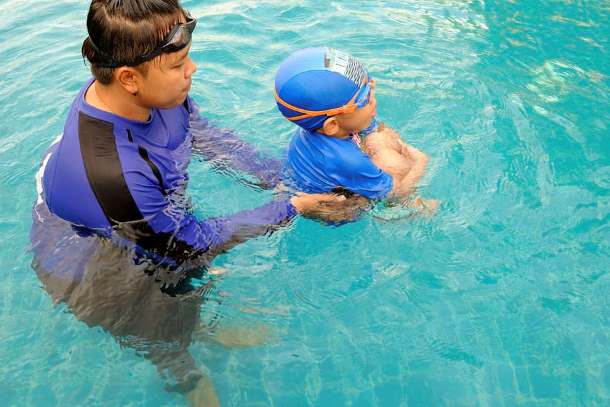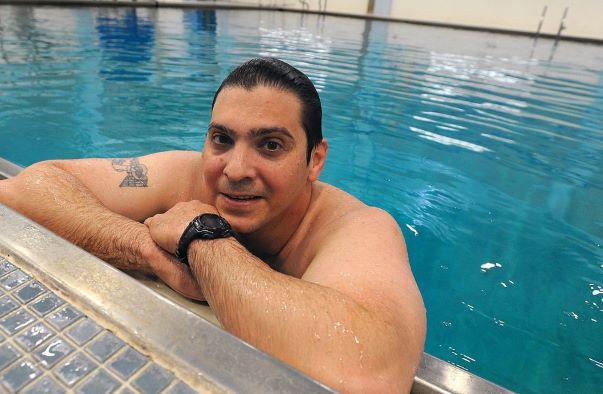Conquering Your Phobia: 10 Tips to Overcome Your Fear of Swimming
If you would like to learn how to swim by yourself but are afraid of getting started, this short post is for you.
The allure of a refreshing dip on a hot summer day or the invigorating feeling of gliding through the water can be incredibly tempting.
But for many people, a real fear of getting their feet wet overshadows the desire to swim. This fear, often referred to as aquaphobia, can manifest in various ways, including:
- Fear of drowning
- Claustrophobia from being underwater
- Fear of the unknown depths of water
- Panic attacks triggered by water immersion
- Unpleasant experiences in water in the past
While these fears can feel overwhelming, the good news is that you can learn to swim, even if you’re scared of water.
With the right approach and a supportive environment, you can overcome your anxieties and unlock the joys and benefits of swimming.
So, before you get into that swimming attire, how do you feel? Well, keep reading so that you can see everything there is to know about the fear of swimming.
Why am I so scared of swimming?

Every person who is or was afraid of swimming has something that triggers their fear. Therefore, what causes your fear of swimming is different from what causes the other person’s.
To summarize, the fear of swimming for many people can stem from various factors, such as:
Negative past experiences: Perhaps you had a frightening encounter with water as a child, or maybe you witnessed someone else struggling in the water.
Lack of exposure: If you haven’t been around water much throughout your life, the unfamiliarity can breed stress and anxiety.
Misconceptions and myths: Media portrayals of dangerous water situations or exaggerated stories about underwater creatures can contribute to anxiety.
Underlying anxieties: Sometimes, the fear of jumping in the pool can be linked to broader anxieties, such as fear of heights or fear of losing control.
Can I learn to swim if I am scared of water?
Absolutely! Many people have successfully overcome their fear of water and learned to swim at various stages of their lives. Indeed, you can even start getting your nose underwater, but it will take time.
The key is to approach the process gradually and with patience, seeking guidance and support from qualified swimming instructors.
If you get to the pool, start your experience at the shallow end of the pool. Do this often so that you can get used to the water.
How to overcome your fear of swimming as a beginner: 10 Tips

You will not overcome your fear of swimming in one, two, or three days. It takes time and patience. However, the most important thing is to get started. Here are several tried and proven tips to get you swimming without fear, ASAP:
1. Start small and grow from there
Begin by familiarizing yourself with water in a controlled environment. Take a shower, sit by the pool, or dip your feet in the shallow end. Gradually increase your exposure as you feel more comfortable.
Don’t forget to practice putting your face underwater too. You can start in the bathtub, breathe in, hold, close your eyes, and dip your face in cold water in the tub. Stay that way for several seconds, and then get out, and repeat.
Keep doing this until you lose all fear of getting your face in the water.
2. Find a supportive instructor
If you cannot do it alone, you can enroll in swimming lessons with a qualified and patient instructor who understands your fears. Look for someone who specializes in teaching adults or individuals with aquaphobia.
If you are doing it alone, find a video on YouTube, or just practice with the tips I have shared in this article.
3. Work on your relaxation techniques
Techniques like deep breathing and meditation can help manage anxiety before and during your lessons. Practice calming yourself down when you start to feel nervous.
You can try inhaling, holding it in for as long as possible, and then releasing it. This is going to make your lungs stronger, and you will appreciate the fruit of your efforts when you start swimming.
4. Set realistic goals
Don’t overwhelm yourself by aiming to become an Olympic swimmer overnight. Set small, achievable goals, such as floating in water for 10 seconds or completing a short distance across the pool. Celebrate each accomplishment, no matter how small.
5. See your success in your mind
Imagine yourself swimming confidently and enjoying the experience. Visualization can help reframe negative thoughts and create a positive association with water.
Think of this as the same anxiety you felt when you were learning to drive a car. Remember how exhilarating it felt to finally drive on your own? By learning to swim at 40 or any age, there is everything to gain and nothing to lose.
6. Start swimming with a friend
Whenever possible, have a supportive friend or family member accompany you to lessons or practice sessions. This is going to boost your confidence and provide moral support.
7. Gear up properly for swimming
Using appropriate swimming gear, to minimize the irritation from the water, makes swimming safer and more fun. Try the following:
Wear a life jacket for swimming: It keeps you safe from drowning, and it boosts your confidence a great deal so you can learn faster.
Wear Swimming Goggles: Chlorine is bad for the eyes, so it is best to keep the swimming pool water out. Besides, you can even get swimming goggles to wear over your spectacles.
Use a nose clip: This one can alleviate anxieties about putting your face in the water or feeling unsafe. Some water will definitely get into your nose, and it will make you feel irritated.
Use ear plugs: Using ear plugs keeps the water out of your ears when you are swimming. This can prevent ear infections.
Wear a swimming cap: Latex or silicone swimming caps keep your hair in line, preventing it from dragging all over the water. Remember, hair fibers can also break away and clog the swimming pool filter pump.
Wear swimming gloves if it is too cold: This is optional, and only necessary when you are wearing a wetsuit for swimming, water shoes, and now, gloves for swimming. Only wear these if the water is too cold.
8. Maintain focus and stay positive
When fear arises, as it definitely will, focus on your breath and your current surroundings. Do not entertain negative thoughts or worst-case scenarios in your mind.
9. Celebrate your progress
If you learn any of the 5 swimming strokes, celebrate. If you learn anything new or make some progress in the water, feel great! You have earned it already.
10. Be patient and kind to yourself
Overcoming a fear takes time and effort. Be patient with yourself, don’t get discouraged by setbacks, and remember that progress, not perfection, is the goal.
The importance of swimming gear
The right swimming gear can play a significant role in enhancing your comfort and confidence in the water.
Here are some essential items to consider:
Well-fitting swimsuit: A comfortable and supportive swimsuit that allows for ease of movement can make a big difference.
Life jacket: Using a life jacket, especially during initial practice sessions, can provide a sense of security and buoyancy.
Swimming goggles: Goggles protect your eyes from chlorine and allow you to see clearly underwater, reducing anxiety about the unknown.
Nose clip (optional): A nose clip can help prevent water from entering your nose, which can be a common concern for beginners.
Remember, the specific gear you choose may vary depending on your individual needs and preferences.
Consult with your instructor or a knowledgeable salesperson for guidance on selecting the right equipment.
How fast can I learn how to swim?
The pace of learning to swim varies depending on several factors. These include your prior experience, comfort level in water, and the frequency and intensity of your practice sessions.
With consistent effort and the guidance of a qualified instructor, most people can begin feeling comfortable and confident in the water within a few weeks or months.
Also check my past articles on:
Does swimming in the ocean help a yeast infection?
